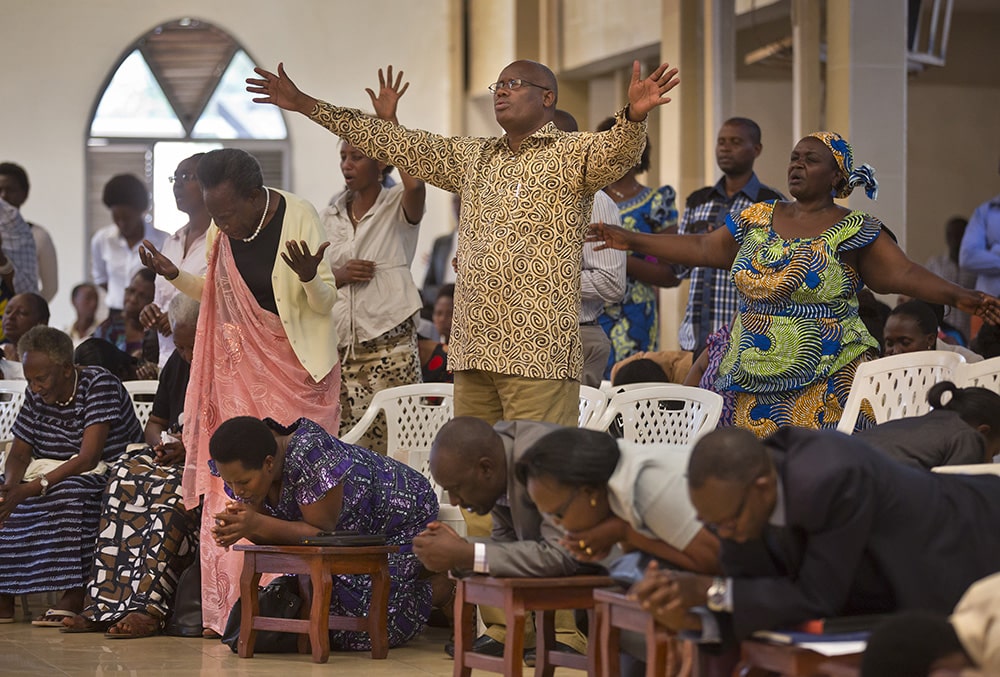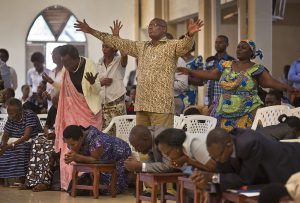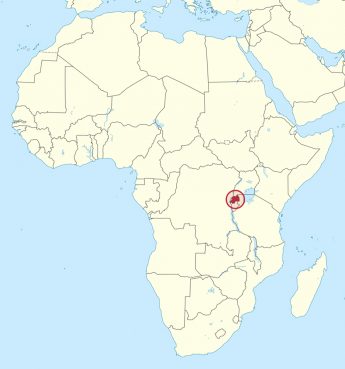
NAIROBI, Kenya (RNS) — In a crackdown, Rwanda has shut down more than 5,600 places of worship over failure to meet the conditions required for operation.
Churches, mosques, caves, and tents affected by the shutdown were found to have fallen short of the standard requirements set by 2018 laws, according to officials conducting the two-week process that started July 29.

Rwandans sing and pray at the Evangelical Restoration Church in the Kimisagara neighborhood of Kigali, the Rwandan capital, on April 6, 2014. (AP Photo/Ben Curtis)
The law requires clerics to have theology degrees, and faith organizations to register with the government and have clear statements indicating their doctrine. The statements should be deposited with the Rwanda Governance Board, the government agency that registers houses of worship and other civil society organizations. Houses of worship must also pass safety and hygiene codes.
“I think what was introduced — not today but five years ago — is good for the church. The government gave us five years to comply and kept giving us reminders. That ended last year in September,” Anglican Archbishop Laurent Mbanda of Rwanda told Religion News Service in a telephone interview.
“I think this was enough time to comply. We need to look at this from a positive side.”
The Rwanda Governance Board introduced the rules and standards to tame what officials viewed as an unregulated proliferation of churches.
Mbanda said the rules were good for the improvement of congregations and the people’s worship environment.
“We are talking about aeration, sound control … toilets for men and women,” said Mbanda. “I think there is nothing out of the ordinary about these.”
Most affected by the shutdowns were small Pentecostal churches and some mosques, reportedly operating on riverbanks and in caves. Many of these had no address, and according to some claims, were prone to indoctrinating their followers and exploiting congregants.
“I think most people agree with this. There has to be training of clergy, order, and sanity in the churches’ operation, so that religion serves its purpose,” the Rev. Innocent Halerimana Maganya, a Congolese Catholic priest at Tangaza University in Nairobi, told RNS. “In the current state of affairs, it is the poor who are suffering exploitation.”

Rwanda, circled in red, in East Africa. (Map courtesy of Wikipedia/Creative Commons)
Rwanda — an East African country with 12 million people — is largely Christian. According to the 2022 census, about 48% of its citizens are Protestants, but the Roman Catholic Church forms the largest single denomination, with 40% of the population identifying as such.
The country, approximately the size of the U.S. state of Maryland, had 15,000 churches in 2019, according to official figures. Only 700 were legally registered at the time.
After the 1994 genocide, which killed an estimated 800,000 people, mostly members of the Tutsi ethnic group and some moderate Hutus, the country’s churches were widely accused of complicity in the violence. Some of the churches were sites of massacre where fleeing civilians had sought refuge. Priests and pastors faced accusations of killing or aiding the murders.
Later, some of the clerics faced charges of crimes against humanity at the International Criminal Tribunal for Rwanda in the city of Arusha, in neighboring Tanzania.
Paul Kagame, now Rwanda’s president, and then the general hailed for stopping the killings, has frequently raised concerns over the proliferation of churches.
In August last year, Kagame threatened to arrest Catholic pilgrims visiting sites in the country, accusing them of worshipping poverty. He voiced a concern that many young people were spending more time praying at prayer sites than working to end their impoverishment.
“No one must worship poverty. Do not ever do that again. … If I ever hear about this again, that people traveled to go and worship poverty, I will bring trucks and round them up and imprison them, and only release them when the poverty mentality has left them,” Kagame, a Catholic, was quoted in the press as saying recently.
Some critics fear the government is infringing on people’s freedom of worship, but clerics and officials say it is about the safety and protection of worshippers.
“Rwanda has freedom of worship,” said Mbanda. “I think we are starting churches where they should not be. Sometimes we are having church structures that a god cannot live in, let alone a person.”
The archbishop also highlighted the rise of unlicensed preachers, cautioning that some were taking their followers to dangerous caves, rivers, and forests for prayers and retreats.
At the same time, Rwanda’s approach to regulating religious groups is influencing action across the East African region.
In Kenya, a task force formed to investigate the recent Shakahola starvation massacre in the coastal region has recommended the formation of a Religious Affairs Commission, renewed registration of all religious organizations, and the establishment of educational standards for religious leaders, among other actions.






